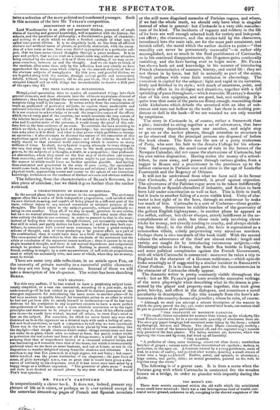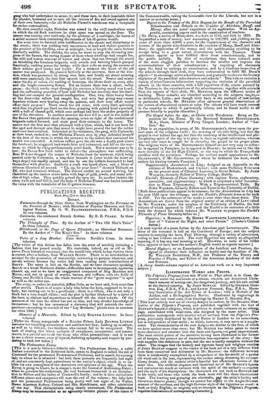MB. PEAKE'S CARTOUCHE
Is unquestionably a clever book. It does not, indeed, present any picture of life as it exists, or perhaps as it cver existed except in the somewhat dressed-up pages of French and Spanish novelists or the still more disguised memoirs of Parisian rogues, and where, if we had the whole truth, we should only have what is singular instead of what is general : but Cartouche is a very able manufac- ture of its kind. The incidents of roguery and robbery in the life of its hero are well enough selected both for variety and independ- ent effect ; the characters, and the stories told by the characters, introduced into the main tale, are for the most part consistent, and furnish relief; the moral which the author desires to point—" that rascality can never be permanently successful "—is rather ably accomplished, not so much in the final punishment of Cartouche, as in his continual disappointments, the ill-gotten gains continually vanishing, and the hero having ever to begin anew. Mr. PEAKS has shown both art and knowledge in his manner of introducing French characteristics of manners, history, and social life : they are not thrust in by force, but fall in naturally as part of the scene, though perhaps with some little confusion in chronology. The execution is capital for the subject : light and rapid in its narrative, lively and finished in its style ; with much of smartness, point, and dramatic effect in its dialogue and situations, together with a full sprinkling of puns throughout,—which resenkble MARTIAL'S descrip- tion i
tion of his own epigrams, and are good, bad, and middling. It s quite true that some of the parts are flimsy enough, resembling those table kickshaws which delude the unversed with an idea of sub- stance and turn out hollow to the teeth : but there is nothing pon- derous or dull in the book—if we are wearied we are only wearied by emptiness.
The story in Cartouche is, of course, rather a framework than a plot ; intended to string together a set of adventures, that have no necessary dependence upon one another, and might stop or go on as the author pleases, though attention to structure is so fur observed that the principal persons are disposed of before the book closes. The hero was the son of a petty tradesman of Paris, who sent his heir to the Jesuits College for his educa- tion. Bad company, the usual cause of ruin in the heroes of the Newgate Calendar, did not cause the aberrations of Cartouche, but his own native disposition. Having stolen the money of a school- fellow, he runs away, and passes through various grades, from a beggar in Rouen and a practitioner in the provinces up to the loftiest eminence in Parisian vice and crime in the age of Louis the Fourteenth and the Regency of Orleans.
It will not be understood from what we have said in its favour that Cartouche, if closely examined, is proof against objection. The adventures of the Parisian rogue seem to be taken indifferently from French or Spanish chevaliers d' industric, and fiction to have been laid under contribution as well as fact. This is little in itself, but it leads to another failing of a more visible kind. Unity of cha- racter is lost sight of in the hero, through an endeavour to make too much of him. Cartouche is a sort of Cerberus—three gentle- men at once. Sometimes he exhibits touches of the generosity of the gallant English highwayman ; in another phase he appears as the selfish, callous, but clever sharper, utterly indifferent in the ac- complishment of his ends, but those ends only involving clever tricks for money, not directly tending to cruelty, and always shrink- ing from blood ; in the third phase, the hero is represented as a remorseless villain, calmly perpetrating very atrocious murders. Perhaps there is also too much of the book itself. With the second volume the adventures of the thief are almost ended : length and variety are sought for by introducing extraneous subjects,—the Mississippi scheme in France, the South Sea bubble in England; and some political conspiracies against the French Government, with all which Cartouche is connected : moreover be takes a trip to England in the character of a German nobleman,—which episode looks amazingly as if suggested by a similar incident in SMOLLETT'S Count Fathom, it is in these last parts that the inconsistencies in the character of Cartouche chiefly appear.
The dramatic writer is pretty constantly visible throughout the work : but as Mr. PEAKE'S good taste avoids the excessive verbiage of the mere playwright when describing what in the drama is pre- sented by the player and property-man together, this trait gives point, brevity, and effect in the dialogues, and sotnetimes a novel peculiarity in description. 'Fake this example from the hero's ad- ventures at the country-house of a jeweller ; whom he robs, of course.
" Although we shall not attempt a minute description of the manner in which the party passed the day, yet, under several brief beads, our readers shall be put in possession of the particulars.
"THE PROPRIETE OF MONSIEUR GARIGUES.
" Villa small; better calculated for summer than winter, as the windows, like most French casements, let in a considerable quantity of wholesome fresh air. The once gay paper- hangings had sustained some injury by the damp ; subject mythological, Actaeon and Diana. The chaste Diana exceedingly mothery ; the skins of most of the hounds had peeled off, and the captured stag's wounds only presented the bare plaster. The balmy summer air, however, which was ripening the vines and fig-trees, had dried up all humidity.
"THE GARDEN.
"A profusion of vines, some trellising, others cut close down ; numberless bunches of grapes ; various sorts of trait-trees trained on espaliers ; melons, in perfection, in the open air. A fountain formed by a young gentleman, made of lead, in a state of nudity, and painted after nature, spouting a small stream of water into a large cockleshell. Endive, sorrel, and spinach, in abundance ; large onions, and garlic, ditto; an armed grenadier, painted on the wall, to frighten away the crows."
The following is of a graver cast. It is from a scene when the Parisian gang with which Cartouche is connected fire the wooden houses on a bridge, in order to plunder with impunity during the alarm.
THE MISER'S END.
There were secrets contained within the old walls which the uninitiated never could have surmised; there was a sad heterogenous fund of wealth con- cealed under-ground, unknown to all, excepting to the shrewd suspicions of the
gang who had undertaken to secure it; and these men, in their insatiable thirst for plunder, hesitated not to turn all the terrors of fire and sword against one of their own fraternity—for old Nicholas Flamers warehouse was a receptacle for stolen commodities.
On that eventful night, Nicholas was seated in the chill comfortless room in which the old flock mattress he slept upon was spread on the floor. The usurer was turning over restlessly, by the glimmer of a rushlight, the leaves of s soiled account-book containing the records of his ill-gotten wealth.
For some time he listened with indifference to the shouts and disturbance in the street; there was nothing very uncommon in loud and violent quarrels in the precinct of his dwelling, even at midnight ; but at length the cause became distinctly audible. The shrieks, the cries for water to stop the devouring pro- gress of the flames, the raving despair of those whose dwellings had caught fire, the wild and hoarse murmur of horror and alarm that ran through the crowd 011 beholding the ferocious brigands, with swords and burning brands grasped frantically, rushing across the bridge, while their yells on seeing the success of their scheme grew louder and louder. For a moment the heart of the old usurer was paralyzed. He glanced furtively at the mattress, then at the win- dow, which was protected by strong iron bars, and finally set about securing stilt more cautiously the door that opened into the street. Nearer and nearer came the din of voices, the rushing of footsteps, the blows dealt on every side, and the bright consuming flames. For an instant there was a silent, sullen pause ; the thick smoke crept through the crevices, a hissing sound was heard, and the suffocating sensation of heat told Nicholas but too truly that his dwel- ling bad not escaped the general conflagration. One, two, three heavy blows at, the door—the rafters had caught fire, and were fast giving way—some brawlers without were beating away the postern, and their next effort would effect their purpose ! There stood the old miser, with every limb quivering Wish fear, his glazed eye fixed on the door, grasping with palsied hand a poniard, with a haft of chased gold, which once perhaps had been the stolen property of one of the obtruders. In another moment the door fell in ; and in the midst of the flames that gathered about the opening, seven or eight of the confederated brigands rushed forward, and made good their entrance to the house. The usurer met the first man that advanced with a blow, which, had it not been for the aged and decrepit arm that aimed it, might have proved the last the robber need ever have received. Infuriated at the resistance, the gang, with Cartonche at their head, rushed in ; and Nicholas Flarnel, step by step, defended himself to the door of the room in which the entrance to the cellars that contained his wealth was concealed. A furious ruffian gave the old man a deadly gash across the forehead; he staggered backwards faint and exhausted, and fell on the mat- tress, to which he clung pertinaciously until death. Not a moment was to be lost ; the flames flew from rafter to rafter—the atmosphere was suffocating. Bras D'Acier dragged the corpse of Nicholas from the mattress, which being pushed aside by Cartouche, a trap-door beneath it (over which the miser al- ways slept) was rapidly opened, and one by one the robbers descended to load themselves with plunder. Suddenly a crash was heard above, and a blaze of crimson illumined all around. " Up, up, for your lives!" shouted Thibault an Di. who had remained without. The thieves needed no second warning, but clambered up the narrow stairs laden with bags of gold, jewels, and many arti- cles of high value. They quickly gained the open air. In another instant the crazy walls and roof fell in, and the body of Nicholas Flamel was buried beneath the ruins with the remainder of his ill-gotten treasure.



























 Previous page
Previous page